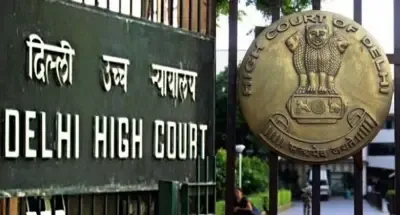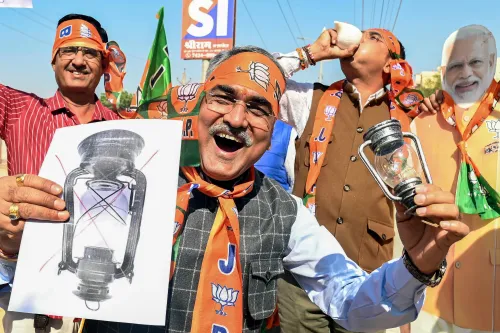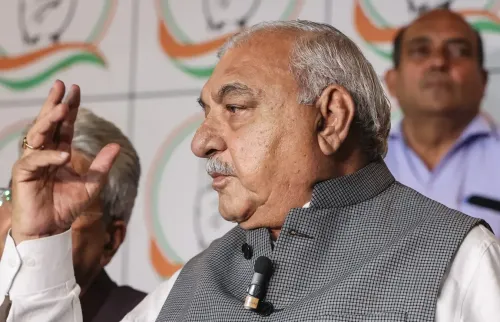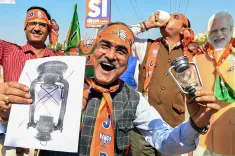Did the Delhi HC Stop Rupa Publications from Selling its 'Coat-Pocket' Constitution?

Synopsis
Key Takeaways
- Delhi High Court restricts Rupa Publications from selling their 'coat-pocket' Constitution edition.
- Design similarity with Eastern Book Company's editions raises consumer confusion concerns.
- Significant investments in marketing by EBC underline the case's commercial stakes.
- Trade dress protection is crucial for maintaining market integrity.
- Next hearing scheduled for February 25, 2024.
New Delhi, Sep 29 (NationPress) The Delhi High Court has issued a restriction against Rupa Publications India Pvt Ltd, forbidding them from publishing and distributing their 'coat-pocket' version of the Constitution of India. The court found the design to be misleadingly similar to the red-and-black editions offered by the Eastern Book Company (EBC).
Justice Manmeet Pritam Singh Arora, in a ruling from a single-judge Bench, stated, 'The defendant's (Rupa Publications) choice of color scheme, font, text layout, gilt edging, book cover color, and embossed gold details resemble those of the plaintiffs (EBC) too closely. Given that both parties operate in the same industry, use identical marketing channels, and target the same customer base, there is a substantial chance of confusion.'
In granting a temporary injunction, Justice Arora emphasized that Rupa Publications had 'lifted' the layout of the EBC’s product 'without any independent creativity.'
'To an unwary consumer of average intelligence and imperfect memory, the trade dress of the defendant’s disputed coat-pocket editions is likely to appear indistinguishable from that of the plaintiffs’ editions. Such a resemblance could mislead consumers regarding the origin of these products,' the court noted.
The lawsuit initiated by EBC, which has been producing compact 'coat-pocket' bare acts since 2009, claimed that Rupa Publications had imitated its unique trade dress, which includes the black-and-red cover design, gold leafing, and specific typography.
The complaint argued that the defendant’s editions 'exhibit striking similarity to the plaintiffs’ coat-pocket editions of bare acts' and that Rupa Publications 'demonstrates an intent to exploit the plaintiffs’ goodwill and reputation.'
Furthermore, the plaintiffs pointed out that Rupa Publications had even modified its long-established red-and-white logo to adopt a golden logo in the same position as EBC’s mark, suggesting the defendant's intention to 'pass off.'
Justice Arora acknowledged that the EBC had made significant investments of over Rs 75 lakh in marketing their 'coat-pocket' editions.
Since 2010, the plaintiffs have successfully sold more than 1,04,805 copies of these editions.
Additionally, they noted that a search of Rupa Publications’ website showed that the defendant does not sell or publish any other legal texts or materials and is solely offering the 'coat-pocket' editions of the Constitution of India.
Emphasizing the commercial implications, the EBC reported a considerable setback in September 2025, when an order for 18,000 copies was canceled after Rupa Publications allegedly misrepresented its edition as a similar but cheaper alternative.
In its ruling, the Delhi High Court cited precedents that protect 'trade dress.' It stated that prolonged usage of a distinctive design accrues goodwill and secondary meaning within the marketplace.
'Trade dress, which encompasses color combinations, layout, shape of containers, and overall design, is vigorously protected against imitation, as it signifies the source of goods. Even with minor stylistic, graphic, or textural differences, long-term market presence provides the product with secondary meaning, bolstering its reputation and goodwill,' the court stated.
Justice Arora concluded that the balance of convenience favored the EBC and ordered Rupa Publications to cease any manufacturing, selling, or advertising of its coat-pocket Constitution bare acts, recall any unsold stock, and remove listings from e-commerce sites.
The case is set to be reviewed again on February 25 of the following year.









